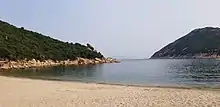Sham Wan (Lamma Island)
Sham Wan (Chinese: 深灣) is a bay in the southeastern part of Lamma Island in Hong Kong.

.jpg.webp)
Archaeological site
Sham Wan is one of the five most important archaeological sites in Hong Kong. The bay is the site of an important Bronze Age settlement which was unearthed by archaeologists in the 1970s. It yielded evidence of people living on Lamma during the "Middle Neolithic" phase (c. 3800–3000 BC).
Fauna
Historically Sham Wan was also a place for green sea turtles to lay eggs. The endangered green turtles are a special group of marine organisms with distinctive navigation behaviour between their nesting, breeding, development and reproduction sites. As Sham Wan is the only existing nesting site for them in Hong Kong, every year there is a period of restricted access to it from 1 June to 31 October to allow the turtles to breed.[1] The breeding site is about 5,100 m2 (54,896 sq ft). The last known nesting at Sham Wan was in 2012.[2]
A part of the bay has been listed as a Site of Special Scientific Interest since 1999.[3][4]
References
- Conservation of sea turtles in Hong Kong
- "How to hike wild side of Hong Kong's Lamma Island: idyllic walk takes in beautiful hillsides and a cosy beach". South China Morning Post. 7 Jul 2018.
- "Register of Sites of Special Scientific Interest (SSSIs)". Planning Department. Archived from the original on 16 August 2023.
- "Site of Special Scientific Interest - Sham Wan, Lamma Island" (PDF). Planning Department. 2 July 1999.